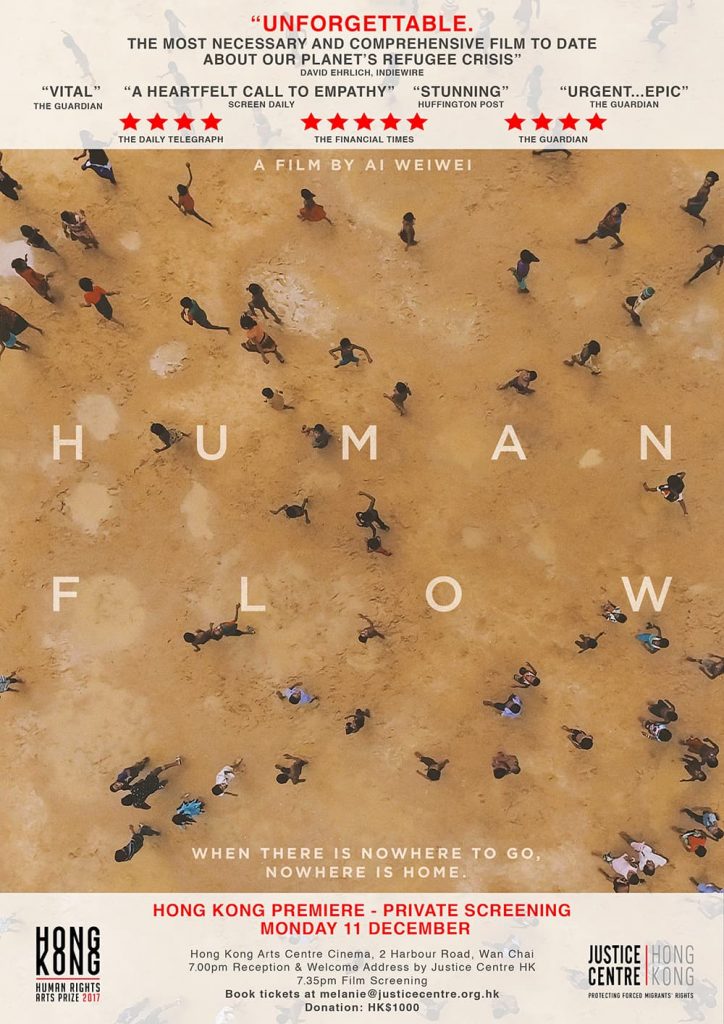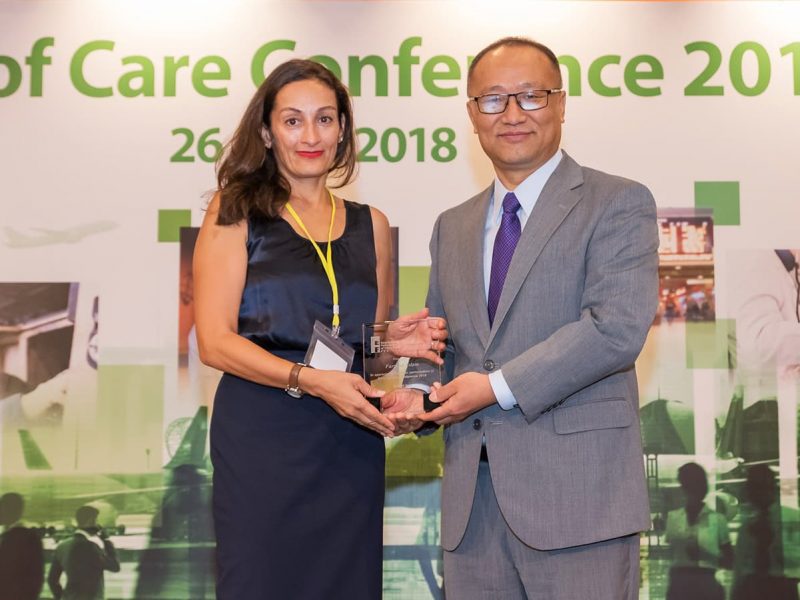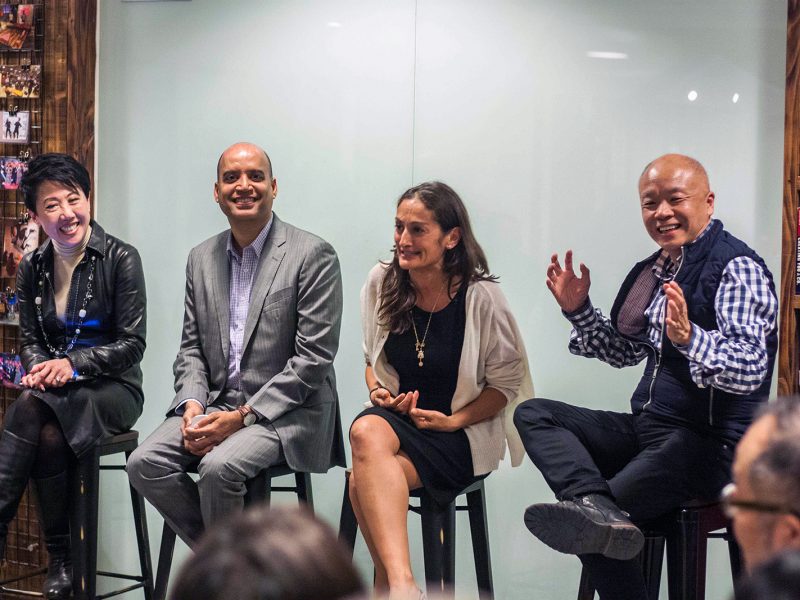
Art as Activism
We all have a short life. We have only a moment to speak out or to present what little skills we have. And if everybody does that, maybe the temperature changes. – Ai Weiwei
I am a believer in the power of art to transform the human condition, to move people in ways that everyday modes of communication simply cannot. I also believe that those with influence, in whatever field, can and ought to help solve the broader political, social and economic challenges facing the world.
This week I had the opportunity of attending a private screening of Ai Weiwei’s debut feature Human Flow organised by Justice Centre Hong Kong (JCHK) in celebration of International Human Rights day and the 70th Anniversary of the Universal Declaration of Human Rights.
Ai Weiwei’s documentary feature provides a visually and emotionally arresting insight into the experience and extent of displacement that pervades our world. With official figures standing at over 65 million refugees globally, the rise of populist and divisive narratives, and the increasing numbers of migrants seeking a better life to escape from economic and environmental hardship, this film could not have been more relevant or timely. Despite its tough subject matter, it is a beautiful and gentle film that leaves an indelible mark. From a recent interview given in The Guardian, it is clear that the film has left such a mark on Ai Weiwei as its maker, but it is also clear that he is looking to use the power of his art to influence those that can make a difference:
All day long, the media ask me if I have shown the film to the refugees: ‘When are the refugees going to see the film?’ But that’s the wrong question. The purpose is to show it to people of influence; people who are in a position to help and who have a responsibility to help. The refugees who need help – they don’t need to see the film. They need dry shoes. They need soup.
Prior to the screening Tessie, a client of Justice Centre gave a reading of her experience as a refugee in Hong Kong. Tessie is one of the 103 individuals (of the 14,000 with outstanding claims) recognised as a refugee under Hong Kong’s Unified Screening Mechanism. I was so moved by her beautifully spoken words I obtained her permission to share them:
“We all know that a border is just a fixed line on a map. They look unnatural – often artificially straight, too precise. And we know too that if we were to zoom in, these lines would gradually translate into fences and walls, built for what they keep in as much as what they keep out.
But borders are more than just this physical line – they are often the way we tell ourselves and each other who and what we are, they are also the edges of what we allow. And they are often the location of scars too – historical, political, personal.
But borders can become prisons.
Indeed as we all sit here, it is all too easy to forget that at this very precise moment people are being held in prison because of their beliefs or because of who they are. The use of torture is still endemic across the world – and many will be forced to endure pain beyond imagining. Some of these people will survive, but may never be quite the same again. Others will never see the light of day. Whether we choose to ignore it or not, it is happening right now as I speak.
Equally, as we all sit and watch this film, a minority of these people will somehow escape – either by luck or due to incredible bravery – almost always both. And they will be faced with life-or-death decisions the results of which will resound for generations. Where do we run to? How do we get there? Who can we trust?
These people will be met with different kinds of borders throughout their journeys, and their lives.
Perhaps you don’t know it, but some of these people fleeing persecution or war will come to Hong Kong. And whether we choose to ignore it or not, many of these people are already here. I am one.
Borders can imprison us in other, more subtle ways. Some borders we have internalized, and in doing so we’ve closed off chambers of ourselves, they prevent us from being able to understand and to feel. It is in this way when we see the faces of those fleeing persecution and our most basic instinct has been denied: to see first a mirror.
Despite all of its dizzying wealth and success Hong Kong has one of the lowest acceptance rates of refugees in the world – it is lower than 1%. This means that almost certainly people in need of protection are being refused. They will face torture or death if they are returned.
This should be a source of shame.
Justice Centre Hong Kong provides critical assistance to those seeking asylum in Hong Kong. I would ask you to please support them and the work they do for those refugees who are living all around you. Those refugees who, like me, you may have otherwise overlooked.
Thank you.”
Justice Centre’s screening of Human Flow was part of a number of fringe events organised around the Hong Kong Human Rights Arts Prize 2017. Justice Centre’s exhibition featuring 26 works of art on the theme of human rights by HK artists is open through 16 December 2017 at BlindspotGallery, and their silent auction can be found at hkhumanrightsartsprize.org
- Posted In:
- Business & Human Rights
- Human Rights
Farzana Aslam
Director and Principal Consultant at Kintillo, Farzana has over two decades of professional experience including as an employment law Barrister (3 Hare Court, Middle Temple, London), in-house employment Counsel (Goldman Sachs, Asia-Pacific and Japan), Principal Lecturer, Law Faculty, the University of Hong Kong (Professional Ethics, Civil Litigation, Employment Law, Business and Human Rights), and Chair of Justice Centre Hong Kong.
All stories by: Farzana AslamYou might also like
-
Ariana Magazine | Up to Code – Women in STEM https://kintillo.com/wp-content/uploads/2019/05/ariana-magazine-2018-up-to-code-pg124-125_1400x566-1024x414.jpg 1024 414 Farzana Aslam Farzana Aslam https://kintillo.com/wp-content/uploads/2022/05/Kintillo-Farzana-Aslam_headshot-front-BW_450x450-150x150.jpg

-
-

